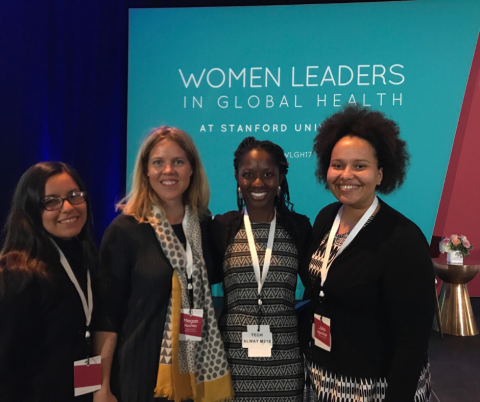Pocket Colposcope: Analysis of Bringing Elements of Referral Services to Primary/Community Care (2018-2019)
Invasive cervical cancer affects 500,000 women worldwide each year. Unlike most cancers, it is highly preventable through the screening, diagnosis and treatment of cervical precursor lesions.
Colposcopy with biopsy is the gold standard for diagnosis of precancerous lesions. However, colposcopes are expensive, and require referral to a facility that can house this machine as well as a trained colposcopist who can interpret the images. These factors make colposcopy inaccessible to the many women in low- and middle-income countries who are at greatest risk for developing cervical cancer.
To address this limitation, Duke researchers have developed a device called the Pocket Colposcope. It is more than an order of magnitude less expensive and lighter than commercial colposcopes. The first year of this Bass Connections project in 2016-17 was dedicated to performing a global value chain analysis in order to identify leverage points that can increase the likelihood of adoption of the Pocket Colposcope in Peru. In 2017-18, team members focused on launching a community health provider program to implement the Pocket Colposcope at the primary care setting in Peru. The 2018-2019 team focused on the clinical acceptability, economics and policy of the Pocket Colposcope to demonstrate the device’s economic viability in the community health setting.
Team members researching clinical acceptability created three surveys to assess patient and provider views on the use of the device. The surveys were sent to patients not currently using the device, providers not currently using the device and patients enrolled in a clinical trial for the device. Findings from the surveys helped the team conclude that working with reimbursement systems and insurance companies is essential to ensuring provider acceptability. For patients, the team learned that they need to further study the procedures and providers that patients trust.
Team members working on the economics of the device researched which markets were best for their product. The team found that the colposcope was most desired by OB/GYNs replacing equipment or wanting to expand their practices to rural areas. Additionally, family practice practitioners who wanted to expand the scope of their practices were also interested in the device. The team projects that over 9,000 devices will be sold annually, with demand increasing each year.
In terms of policy, the team addressed ethical concerns around the feasibility of performing biopsies. They convened legal, medical ethics and stakeholder panels to discuss how to investigate potential issues and ways to properly regulate the colposcope. Moving forward the team plans to determine policy needs for implementing use of the device into North Carolina.
Timing
Fall 2018 – Summer 2019
Team Outputs
Evaluation of Women's Empowerment in a Community-Based Human Papillomavirus Self-Sampling Social Entrepreneurship Program (Hope Project) in Peru: A Mixed-Method Study. Michelle B. Shin, Patricia J. Garcia, Mary Elizabeth Dotson, María Valderrama, Marina Chiappe, Nimmi Ramanujam, Marlee Krieger, Kristjana Ásbjörnsdóttir, Ruanne V. Barnabas, Sarah J. Iribarren, Sarah Gimbel. 2022. Frontiers in Public Health.
Nimmi Ramanujam. A Multi-Parametric low-cost pocket scope to Image and Quantify the Major Axes of Metabolism and the Associated Vasculature in Biological Tissue ($2,261,666 grant awarded from National Institute of Biomedical Imaging and Bioengineering, 2019)
Pocket Colposcope: Analysis of Bringing Elements of Referral Services to Primary/Community Care (poster by Valentina Alvarez, Karina Moreno Bueno, Ryan Fitzgerald, Michyla Greene, Liv McKinney, Morgan McKinney, Elena Roberts, Diana Zabala, Lillian Zhu, presented at Bass Connections Showcase, Duke University, April 17, 2019; runner up, Bass Connections Poster Competition, Audience Award)
Videos
Calla Stories: Past, Present, and Futures
The Calla Documentary (Summer Update)
People of GWHT: Education + Empowerment through Technology
Reflections
This Team in the News
Cervical Cancer Team: Developing Interventions for Cervical Cancer Screening and Diagnosis
Women’s Health: It’s Personal for Nimmi Ramanujam
Karina Moreno Bueno Reflection
These Ph.D. Graduates Incorporated Bass Connections into Their Doctoral Education
Class of 2019: Learning What It Takes to Take Innovative Health Care Global
Ep. 62: Improving Women’s Healthcare: The Calla Campaign
The (In)visible Organ Documentary Overview
Meet the Three Juniors Vying for DSG President
Safe, Convenient, Affordable: How a Pocket Device Is Changing Women’s Health
Q&A with a Duke Inventor Dedicated to Reforming Women's Health
DGHI's Unique Approach to Global Health
Arts+ at Duke: Nimmi Ramanujam, Engineering Pianist
Global Health Is Why I'm an Engineer
See related teams, Pocket Colposcope: Analysis of Bringing Elements of Referral Services to Community Care (2019-2020) and Pocket Colposcope: Increased Distribution and Adoption (2017-2018).

Team Leaders
- Marlee Krieger, Pratt School of Engineering-Biomedical Engineering
- Nimmi Ramanujam, Pratt School of Engineering-Biomedical Engineering
/graduate Team Members
-
Daniel Harriman, Business Administration-MBA
-
Christopher Lam, Global Health - MSc
/undergraduate Team Members
-
Valentina Alvarez, Psychology (AB)
-
Ryan Fitzgerald, Biology (BS)
-
Michyla Greene, Biology (BS)
-
Olivia McKinney, Biology (BS)
-
Morgan McKinney, Public Policy Studies (AB)
-
Karina Moreno Bueno, Biology (BS)
-
Diana Zabala, Global Health (MIN)
-
Lillian Zhu, Biology (BS)
/yfaculty/staff Team Members
-
Libby Dotson, Pratt School of Engineering-Biomedical Engineering
-
Megan Huchko, School of Medicine-Obstetrics and Gynecology
-
Elena Roberts, Pratt School of Engineering-Biomedical Engineering
-
Christina Silcox, Margolis Center for Health Policy
/zcommunity Team Members
-
Lincoln Community Health Center
-
Gino Venegas, La Liga Contra el Cancer
